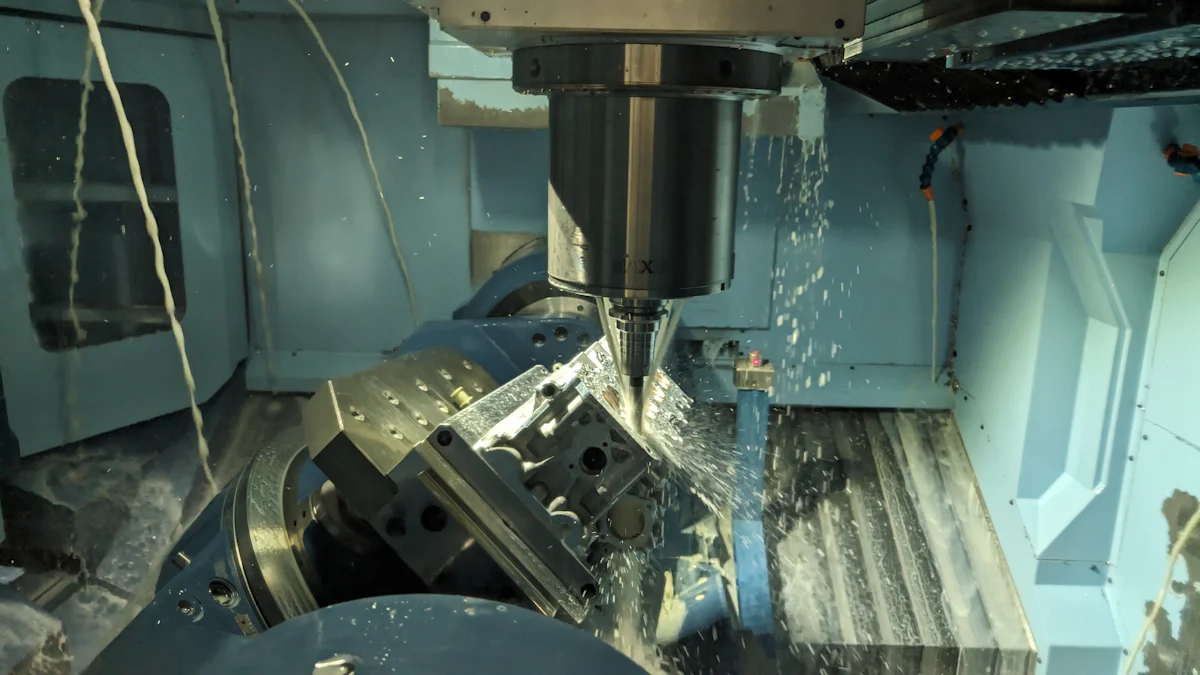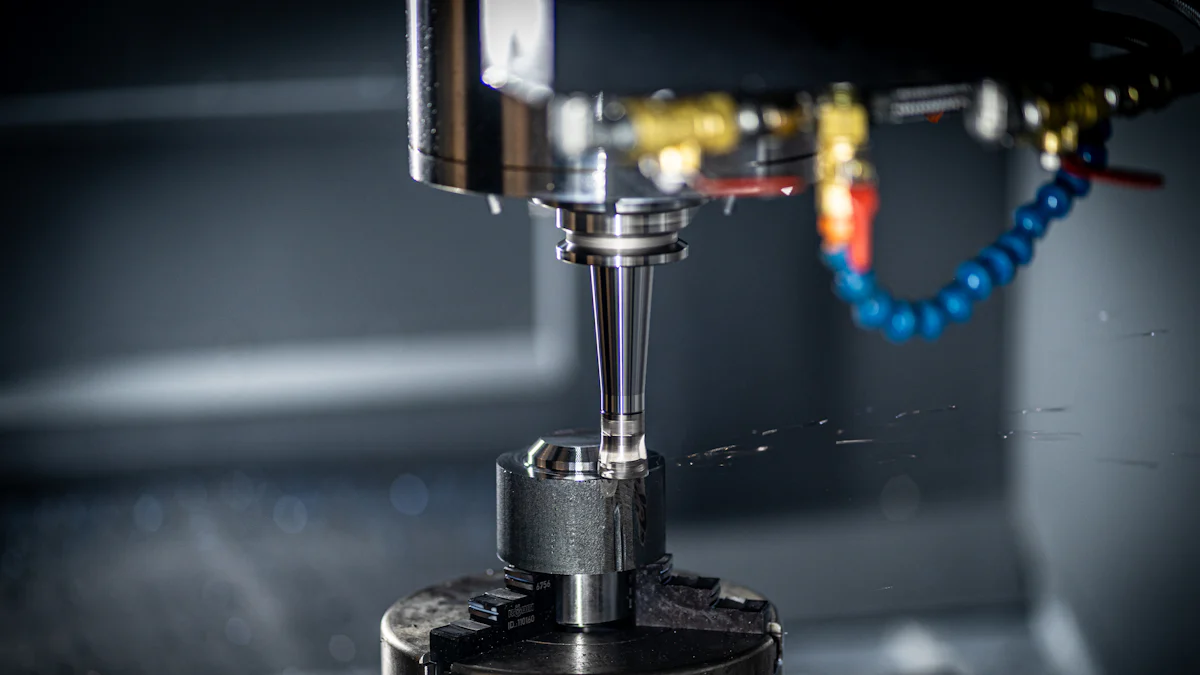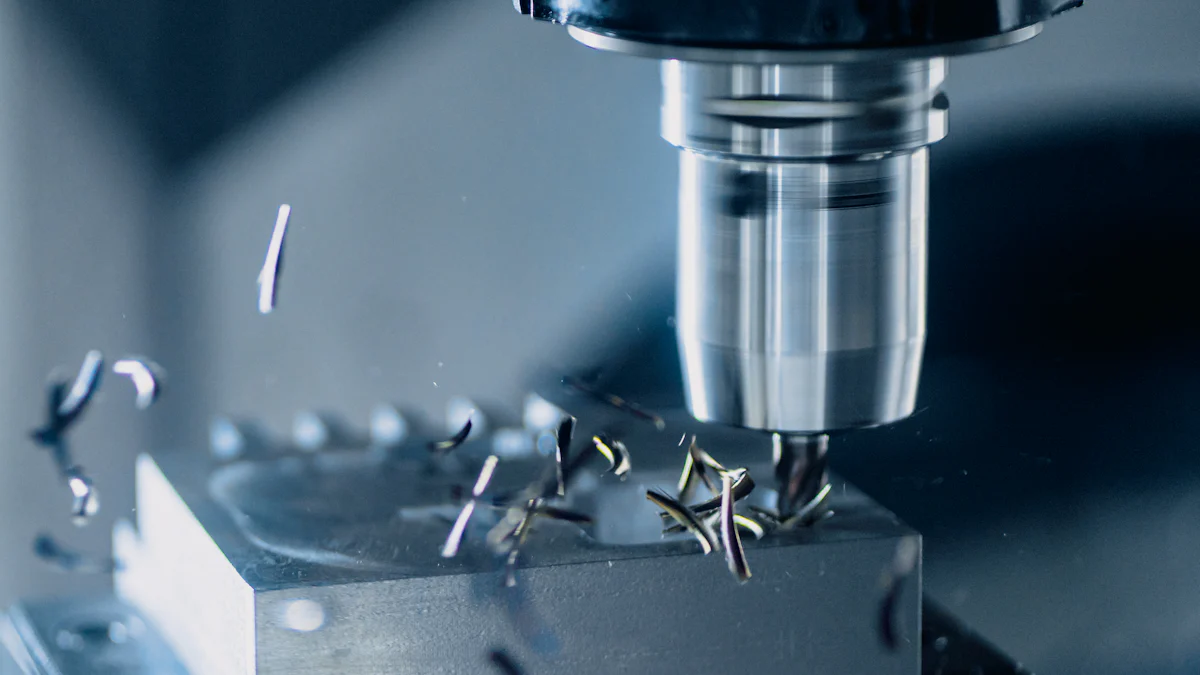Why Sustainable Manufacturing Relies on CNC Machining

Sustainable manufacturing depends on technologies that reduce waste and conserve resources. CNC machining plays a vital role in this effort by offering unmatched precision and efficiency. You can see its impact in how it optimizes cutting parameters to lower energy use and incorporates advanced sensors to minimize material waste. By adopting energy-efficient technologies and exploring eco-friendly materials, CNC machining supports a circular economy. These innovations not only reduce environmental impact but also ensure that manufacturing practices meet the needs of future generations without compromise.
Key Takeaways
CNC machining cuts materials carefully, wasting less and saving resources.
Energy-saving CNC machines use less power, cutting costs and helping the planet.
CNC machines can work with green materials, reducing harm to nature.
Strong parts made by CNC last longer, so less gets thrown away.
Using CNC machines makes work better, shows care for the Earth, and draws eco-friendly investors.
Understanding CNC Machining and Sustainable Manufacturing
What is CNC Machining?
How CNC machining works
CNC machining, or Computer Numerical Control machining, uses pre-programmed software to control machinery and tools. You input design specifications into the system, and the machine executes precise cuts, drills, or shaping tasks. This process eliminates manual intervention, ensuring consistent results. CNC machines operate on a subtractive manufacturing principle, where material is removed from a solid block to create the desired shape. The precision of this method minimizes errors, making it ideal for industries requiring high accuracy.
Key features: automation, precision, and versatility
CNC machining stands out for its automation, precision, and versatility. Automation reduces human error and speeds up production. Precision ensures that every product meets exact specifications, minimizing material waste. Versatility allows you to work with various materials, including metals, plastics, and composites. These features make CNC machining a cornerstone of sustainable manufacturing by reducing resource consumption and environmental impact.
What is Sustainable Manufacturing?
Principles of reducing environmental impact
Sustainable manufacturing focuses on minimizing the environmental impact of production processes. It emphasizes energy efficiency, waste reduction, and the use of cleaner technologies. By adopting CNC machining, you can align with these principles. For example, energy-efficient CNC machines consume less power, reducing greenhouse gas emissions. Additionally, recycling leftover materials and reusing scrap contribute to a circular economy, ensuring fewer resources are wasted.
Importance of resource efficiency and waste minimization
Resource efficiency is critical in sustainable manufacturing. CNC machining excels in this area by optimizing material usage. Its precision reduces offcuts and shavings, which are common in traditional methods. This not only conserves raw materials but also lowers production costs. Furthermore, CNC machining supports the exploration of sustainable materials, ensuring products have a minimal ecological footprint throughout their lifecycle.
Benefits of CNC Machining for Sustainable Practices

Precision and Material Efficiency
Minimizing material waste through precision
CNC machining excels in precision, which directly contributes to reducing waste. By using advanced software and tools, you can achieve exact measurements and avoid unnecessary material removal. This precision ensures that every cut and shape aligns with the design, leaving minimal scrap. Techniques like nesting optimization allow you to organize multiple parts on a single sheet, maximizing material usage. Additionally, part consolidation combines several components into one, streamlining the process and conserving resources. These practices not only enhance material efficiency but also support sustainable practices by conserving environmental resources.
Reducing errors and rework in production
Errors in manufacturing often lead to wasted materials and energy. CNC machining minimizes these issues by automating processes and ensuring consistent results. The accuracy of CNC machines reduces the need for rework, saving both time and materials. Optimized machining strategies, such as adaptive toolpaths, further enhance productivity by reducing unnecessary material removal. This approach aligns with sustainable practices by reducing waste and improving overall efficiency.
Energy Efficiency
Optimized energy use in CNC operations
CNC machining supports energy efficiency through advanced operational techniques. You can optimize toolpaths using computer-aided manufacturing (CAM) software to minimize unnecessary movements, reducing energy consumption. Modern CNC machines often include energy-efficient features like regenerative braking systems and variable speed drives, which adjust machine speeds based on demand. Real-time monitoring systems also help track energy use, allowing you to identify inefficiencies and make improvements. These strategies ensure that CNC machining remains a sustainable choice for manufacturing.
Comparison with traditional manufacturing methods
Compared to traditional manufacturing, CNC machining offers significant energy savings. Traditional methods often involve manual processes that lack precision, leading to higher energy consumption and material waste. In industries like automotive and aerospace, CNC machines have demonstrated up to 30% reductions in energy usage when energy-efficient technologies are implemented. By adopting CNC machining, you can achieve both energy efficiency and material efficiency, making it a superior option for sustainable practices.
Waste Reduction
Recycling and reuse of leftover materials
CNC machining promotes recycling materials and reusing scraps, which reduces environmental impact. You can work with recycled metals and plastics, contributing to a circular economy. Systematic procedures for collecting and repurposing leftover materials ensure that nothing goes to waste. For example, recycling metal scraps helps preserve natural resources and reduces the need for raw material extraction. These efforts align with waste reduction goals and support sustainable manufacturing.
Reduction of scrap and byproducts
Effective waste reduction strategies in CNC machining include selecting standard-sized stock materials and implementing lean manufacturing principles. Closed-loop systems collect and reintroduce waste materials into production, further minimizing scrap. By choosing appropriate materials during the design phase, you can reduce excess and ensure efficient material usage. These practices not only lower costs but also contribute to reducing waste, making CNC machining an essential tool for sustainable practices.
Durability and Longevity
High-quality, long-lasting products
CNC machining produces components with exceptional quality and durability. Its precision ensures that every part meets exact specifications, reducing the likelihood of defects. This consistency enhances the reliability of products across various industries. For example, in the oil and gas sector, CNC machining creates high-precision components capable of withstanding extreme conditions. In defense, it guarantees that military equipment parts function flawlessly. Consumer goods manufacturers also rely on CNC machining to produce intricate, high-quality components with consistent precision.
Industry | Evidence |
|---|---|
Oil and Gas | CNC machining is essential for producing high-precision components that can withstand extreme conditions. |
Defense | CNC machining guarantees that parts for military equipment meet exact specifications every time. |
Consumer Goods | CNC machining enables the production of high-quality, intricate components with consistent precision. |
You benefit from this level of quality because it reduces defects and rework. Fewer errors mean fewer warranty claims and less downtime. Components produced through CNC machining fit seamlessly and function reliably, which extends their lifespan. This durability makes CNC machining a cornerstone of sustainable manufacturing.
Reducing the need for frequent replacements
Durable products reduce waste by minimizing the need for replacements. CNC machining ensures high-quality output, resulting in components with longer lifespans. This longevity lessens the environmental impact of manufacturing new products. When you use CNC-machined parts, you contribute to sustainability by reducing the demand for raw materials and energy.
For instance:
CNC machining reduces defects, which lowers the need for replacements.
Long-lasting components decrease the frequency of repairs and replacements.
Precision manufacturing ensures that products perform reliably over time.
By choosing CNC machining, you support a manufacturing process that prioritizes durability and sustainability. This approach not only benefits the environment but also saves costs in the long run.
Real-World Applications of CNC Machining in Sustainable Manufacturing

Automotive Industry
Lightweight, fuel-efficient components
CNC machining plays a critical role in creating lightweight and fuel-efficient automotive components. By enabling the use of advanced materials like aluminum and composite alloys, it helps reduce the overall weight of vehicles. Lighter vehicles consume less fuel, which improves efficiency and lowers emissions. This shift supports the automotive industry's move toward sustainable transportation solutions.
You can also see CNC machining's impact in the production of suspension components. These parts ensure reliability and safety while enhancing vehicle performance. Additionally, the integration of AI in CNC machining optimizes energy use and minimizes waste during manufacturing. These advancements promote green practices and align with sustainability goals.
CNC machining allows the use of alternative materials to improve performance and reduce costs.
It ensures precision in producing critical components like suspension systems.
AI integration enhances energy efficiency and reduces material waste.
Aerospace Industry
Precision manufacturing of eco-friendly aircraft parts
In the aerospace industry, CNC machining supports the creation of eco-friendly aircraft parts. Its precision cutting processes and optimized toolpaths reduce material waste significantly. Advanced multi-axis machining ensures efficient material usage and allows for recycling unwanted scraps.
You benefit from the use of materials like titanium and aluminum, which offer strength and recyclability. High-performance composites made from eco-friendly polymers are also popular in aircraft manufacturing. CNC machining further supports sustainability by using energy-efficient machines and recyclable coolant systems. These practices minimize environmental impact and contribute to leaner production methods.
CNC machining reduces waste through precision and recycling.
It uses strong, recyclable materials like titanium and aluminum.
Energy-efficient machines and renewable energy sources lower emissions.
Renewable Energy Sector
CNC machining for wind turbines and solar panels
CNC machining is essential in producing components for renewable energy systems like wind turbines and solar panels. This technology ensures the precision needed for complex parts, minimizing material waste and enhancing efficiency. For example, wind turbine blades require intricate designs that CNC machining can achieve with high accuracy. Similarly, solar panel frames benefit from its ability to create durable and lightweight structures.
By using CNC machining, you align with sustainability goals in the renewable energy sector. Its ability to produce high-quality components supports the development of clean energy solutions, reducing reliance on fossil fuels and lowering carbon footprints.
Medical Industry
Sustainable production of medical devices and implants
CNC machining plays a vital role in the sustainable production of medical devices and implants. Its precision ensures that every component meets exact specifications, which reduces material waste. You can rely on this technology to optimize the use of raw materials, aligning with eco-friendly initiatives in the medical industry. For example, CNC machining minimizes offcuts and scrap during the production of surgical instruments, prosthetics, and implants. This efficiency not only conserves resources but also lowers production costs.
The ability to work with biocompatible materials makes CNC machining an ideal choice for medical manufacturing. Materials like titanium and stainless steel, commonly used in implants, require precise machining to ensure safety and functionality. CNC machining allows you to create intricate designs, such as custom implants tailored to individual patients. This level of customization reduces the need for mass production, further supporting sustainable practices.
Recycling and reusing materials also contribute to sustainability in medical manufacturing. CNC machining enables you to collect and repurpose leftover materials, reducing waste. For instance, unused titanium shavings from implant production can be recycled and reintroduced into the manufacturing process. This approach aligns with the principles of a circular economy, where resources are reused rather than discarded.
Energy-efficient CNC machines enhance sustainability by lowering energy consumption during production. Advanced features like real-time monitoring help you identify and eliminate inefficiencies. These innovations ensure that medical device manufacturing remains both eco-friendly and cost-effective. By adopting CNC machining, you support a greener future for the healthcare industry while maintaining the highest standards of quality and safety.
Challenges and Future Potential of CNC Machining in Sustainability
Current Challenges
High initial costs of CNC machinery
The upfront cost of adopting sustainable CNC machining technologies can be a significant barrier. Upgrading to energy-efficient machines requires substantial investment. You also need to retrain staff and reconfigure existing processes, which adds to the expense. These costs may discourage manufacturers from transitioning to sustainable practices, even though the long-term benefits outweigh the initial financial burden. Additionally, sourcing eco-friendly materials presents challenges. Ensuring a consistent supply chain while maintaining material quality can be demanding.
Energy consumption during operation
While CNC machining offers precision and efficiency, its energy consumption during operation remains a concern. Machines often run for extended periods, consuming large amounts of electricity. This can increase operational costs and contribute to environmental impact. To address this, you must explore energy-efficient solutions and optimize machining processes to reduce unnecessary energy use.
Future Innovations
Development of energy-efficient CNC machines
Advancements in energy-efficient CNC machines are paving the way for more sustainable manufacturing. Modern machines now feature regenerative braking systems that recover energy during deceleration. Variable speed drives allow machines to adjust speeds based on load, reducing energy consumption. Real-time monitoring systems help you track inefficiencies and make improvements. High-efficiency cutting tools and optimized toolpaths further conserve energy. These innovations ensure that CNC machining aligns with sustainability goals while maintaining productivity.
Integration of AI and IoT for smarter manufacturing
The integration of AI and IoT technologies enhances the sustainability of CNC machining. AI optimizes machining paths and energy control, reducing waste and energy consumption. Smart algorithms analyze real-time data to improve production efficiency. IoT-enabled systems provide insights into machine performance, helping you identify areas for improvement. These technologies not only lower operational costs but also contribute to eco-friendly manufacturing practices.
Expanding Applications
Potential in emerging sustainable industries
CNC machining holds immense potential in emerging sustainable industries. The demand for biodegradable materials is growing, especially in sectors like packaging and medical products. CNC machining enables the use of biodegradable polymers, reducing environmental impact compared to traditional plastics. Industries such as consumer electronics and renewable energy also benefit from CNC machining’s ability to optimize resource utilization and minimize waste. By adopting these practices, you can contribute to a greener future across various sectors.
CNC machining stands as a cornerstone of sustainable manufacturing. Its precision and efficiency reduce waste, conserve energy, and optimize resource use. Across industries, you can see its versatility in creating eco-friendly solutions, from lightweight automotive parts to renewable energy components. By adopting this technology, you align with global sustainability goals and enhance corporate responsibility.
While challenges like high initial costs exist, advancements in energy-efficient machines and AI integration promise a greener future. Sustainable CNC machining not only minimizes environmental impact but also improves operational efficiency and brand reputation. Embracing this approach ensures a lasting contribution to a healthier planet.
Sustainability efforts in CNC machining improve corporate image and attract environmentally conscious investors.
FAQ
What makes CNC machining eco-friendly?
CNC machining minimizes waste by using precise cutting techniques. It optimizes material usage and reduces scrap. Energy-efficient machines and recycling systems further enhance its eco-friendly nature. These features make it a sustainable choice for manufacturing.
Can CNC machining work with sustainable materials?
Yes, CNC machining supports sustainable materials like recycled metals and biodegradable polymers. Its precision ensures efficient use of these materials, reducing waste. You can also recycle leftover materials, aligning with circular economy principles.
How does CNC machining reduce energy consumption?
Modern CNC machines use energy-efficient technologies like variable speed drives and regenerative braking. Optimized toolpaths reduce unnecessary movements, saving energy. Real-time monitoring systems help you identify inefficiencies and improve energy usage.
Is CNC machining cost-effective for sustainable manufacturing?
While initial costs are high, CNC machining saves money in the long run. It reduces material waste, energy consumption, and rework. Durable products lower replacement costs, making it a cost-effective solution for sustainable practices.
What industries benefit most from CNC machining?
Industries like automotive, aerospace, renewable energy, and medical manufacturing benefit greatly. CNC machining creates lightweight, durable, and precise components. These industries rely on its efficiency to meet sustainability goals.
💡 Tip: Adopting CNC machining not only supports sustainability but also enhances product quality and operational efficiency.
See Also
Streamlined CNC Machining Solutions for Accurate Production
Investigating CNC Machining Options for Precise Manufacturing
Recognizing the Significance of Precision CNC Machining Techniques
CNC Technology in Manufacturing: Advancements and Practical Uses
Grasping CNC Machining Fundamentals for Component Production
About US
Follow Us
Your prototype holds unparalleled significance, and we deeply value its uniqueness. Collaborating with you during the preparation phase for running your prototype or parts is a commitment we gladly embrace. Whether it's a single part or a complex assembly, we are dedicated to selecting the optimal tools and pathways to bring your envisioned product to life.
At Precision Fab CNC Machining, we specialize in producing parts for prototypes, short runs, and high-volume production. Our prototyping machine capabilities extend across metal, plastic, and wood machining, with welding fabrication services available to complement and finalize your prototype if required.
Address
Address: Room320 10F, Building A,Nanshan international building, Dayawan District, Huizhou, Guangdong, 516001 China
Contacts
billy@timaycnc.com

